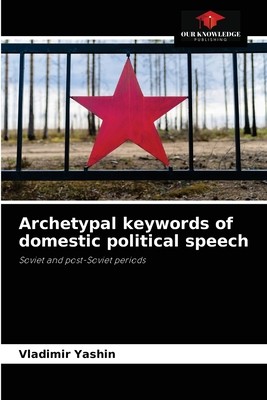
- We will send in 10–14 business days.
- Author: Vladimir Yashin
- Publisher: Our Knowledge Publishing
- ISBN-10: 6203151548
- ISBN-13: 9786203151541
- Format: 15.2 x 22.9 x 1.3 cm, minkšti viršeliai
- Language: English
- SAVE -10% with code: EXTRA
Reviews
Description
This paper presents a comparative analysis of archetypal keywords of the domestic official state political discourse of the Soviet and post-Soviet periods. Archetypal keywords of political speech belong to the commonly used non-political vocabulary, they are common, unnoticeable (unlike ideologems) and are not recognized by speakers as key symbolic words, while these lexemes build a system of common places, going back to the foundations of scientific picture of the world and state ideology. In the composition of the archetypal lexicon of domestic political speech there are lexemes common for the Soviet and post-Soviet periods and specific: common - work, question, task, condition; specific for the Soviet period - comrade, struggle, victory, mass, etc., for modern Russian - system, law, development, interest, etc. The results of the study can make a certain contribution to the theory and methodology of analysis and compilation of political texts, further study of Russian journalistic discourse and argumentative speech in general. The problematic of the work is relevant not only for linguists, but may be of interest to political scientists, journalists and culture experts.
EXTRA 10 % discount with code: EXTRA
The promotion ends in 21d.04:50:32
The discount code is valid when purchasing from 10 €. Discounts do not stack.
- Author: Vladimir Yashin
- Publisher: Our Knowledge Publishing
- ISBN-10: 6203151548
- ISBN-13: 9786203151541
- Format: 15.2 x 22.9 x 1.3 cm, minkšti viršeliai
- Language: English English
This paper presents a comparative analysis of archetypal keywords of the domestic official state political discourse of the Soviet and post-Soviet periods. Archetypal keywords of political speech belong to the commonly used non-political vocabulary, they are common, unnoticeable (unlike ideologems) and are not recognized by speakers as key symbolic words, while these lexemes build a system of common places, going back to the foundations of scientific picture of the world and state ideology. In the composition of the archetypal lexicon of domestic political speech there are lexemes common for the Soviet and post-Soviet periods and specific: common - work, question, task, condition; specific for the Soviet period - comrade, struggle, victory, mass, etc., for modern Russian - system, law, development, interest, etc. The results of the study can make a certain contribution to the theory and methodology of analysis and compilation of political texts, further study of Russian journalistic discourse and argumentative speech in general. The problematic of the work is relevant not only for linguists, but may be of interest to political scientists, journalists and culture experts.


Reviews